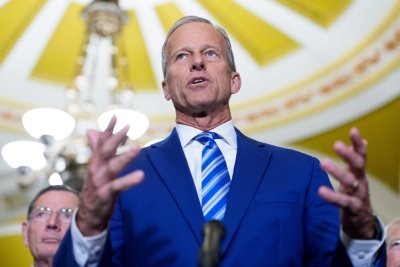Hakeem Jeffries endorses Zohran Mamdani for New York City mayor

Oct. 24 (UPI) — U.S. House Democratic Party leader Hakeem Jeffries on Friday endorsed Democratic Socialist Zohran Mamdani for New York City mayor, 11 days before the Nov. 4 election.
Jeffries hasn’t issued a public statement but his endorsement was confirmed in a statement to The New York Times, with sources telling USA Today and Politico about the House minority leader’s plans.
Early voting begins Saturday.
Mamdani, who was born in India and raised in Uganda, is attempting to become the city’s first Muslim mayor.
Jeffries, who serves Brooklyn in New York, had held off endorsing Mamdani, who is a state assembly member serving Queens since 2020.
The state’s two U.S. senators, Kirsten Gillibrand and Chuck Schumer, the minority leader, haven’t endorsed Mamdani.
Mamdani has been endorsed by New York Gov. Kathy Hochul and Attorney General Letita James.
Also, he has been backed by New York Reps. Jerry Nadler, Adriano Espaillat and Yvette Clarke. Two other House members, Ritchie Torres and Dan Goldman, have said they don’t plan to endorse in the election.
And New York Democratic Party Chairman Jay Jacobs said he doesn’t plan to endorse him.
In the June 24 primary, Mamdani, 34, defeated former New York Gov. Andrew Cuomo, 67, and Mayor Eric Adams, 65. His opponents then chose to run as independents, but Adams dropped out on Sept. 28 and endorsed Cuomo on Thursday.
Mamdani is favored to defeat Cuomo and Republican Curtis Sliwa, 71, a Guardian Angels founder and radio show host. President Donald Trump has pressured Sliwa to drop out to give a better chance for Cuomo over Mamdani, whom he has labeled as a Communist.
Jeffries told The New York Times said they have had “areas of principled disagreement,” including Israel’s war in Gaza, but agreed on other matters, such as the desire to retain New York Police Department Commissioner Jessica Tisch.
“Zohran Mamdani has relentlessly focused on addressing the affordability crisis and explicitly committed to being a mayor for all New Yorkers, including those who do not support his candidacy,” Jeffries wrote.
“In that spirit, I support him and the entire citywide Democratic ticket in the general election.”
Jeffries first met with Mamdani in July in Brooklyn before the primary. They met again in August.
Jeffries had said he was focused on the federal government shutdown rather than the New York City race.
“Stay tuned,” he told reporters this week in Washington. “I have not refused to endorse. I have refused to articulate my position, and I will momentarily, at some point, in advance of early voting.”
Jeffries has questioned how Mamdani would implement his policies and combat antisemitism and gentrification.
“We’ve got to figure out moving forward how we turn proposals into actual plans so that he is successful if he becomes the next mayor, because we need the city to be successful,” Jeffries told CNN last month.
Jeffries noted that his district, which includes historically Black communities, has “been subjected to gentrification and housing displacement.”
Mamdani has sharply criticized Israel and the war in Gaza, which Mamdani describes as genocide.
During Wednesday’s debate, he said: “I look forward to being a mayor for every single person that calls the city home. All 8.5 million New Yorkers, and that includes Jewish New Yorkers who may have concerns or opposition to the positions that I’ve shared about Israel and Palestine.”
Hundreds of rabbis had signed a letter criticizing him.
And powerful real estate and finance industries have donated millions of dollars to political action committees opposing his candidacy.


